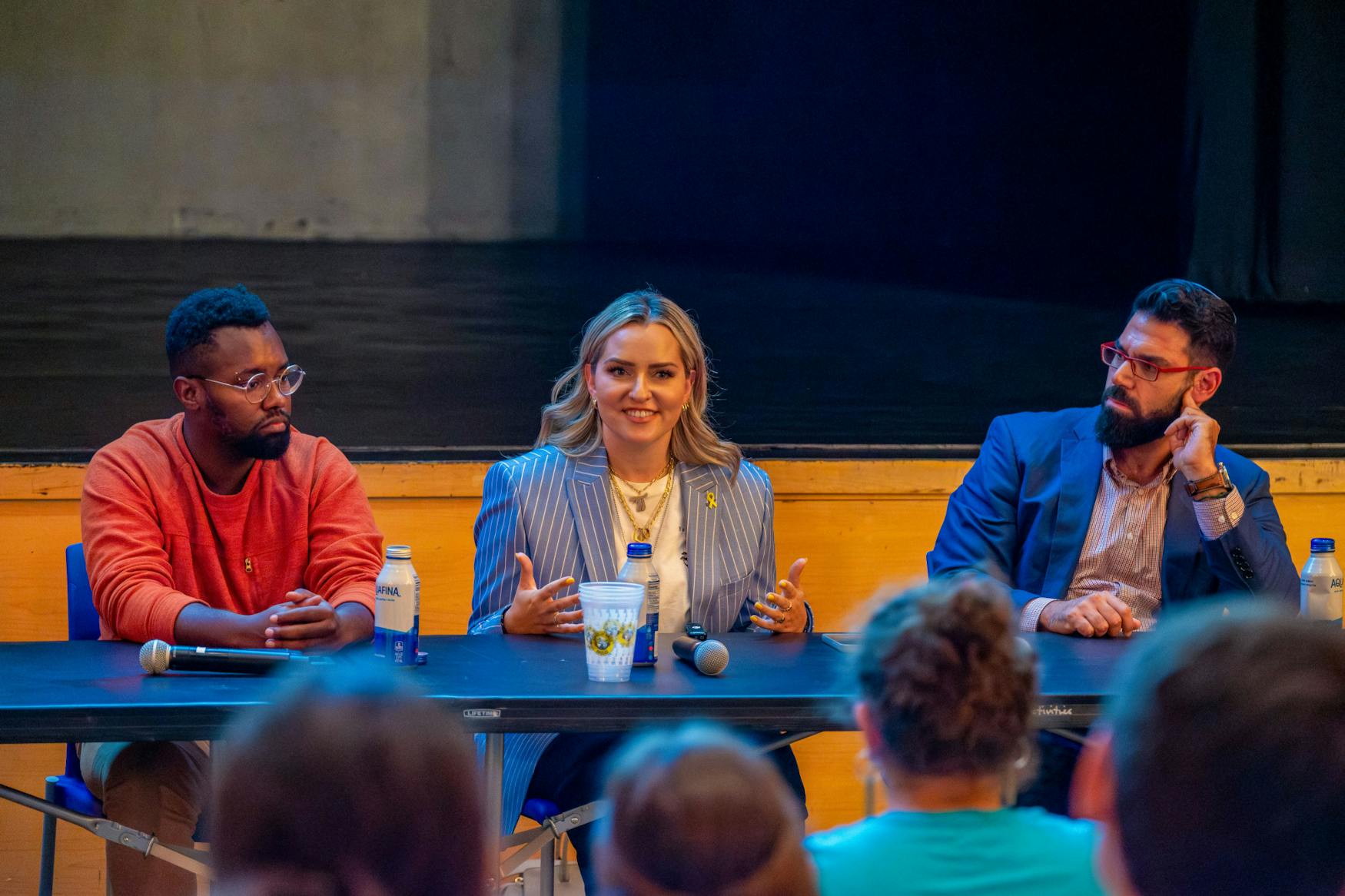Nonpartisan peace start-up, Sharaka, discusses post Oct. 7 mission
The panelists visited Brandeis, sharing personal experiences and calling for peace.
On Wednesday, Sept. 18, Brandeis Hillel hosted a panel discussion featuring Shakara, an organization that seeks to promote peace within the Middle East and North Africa region, in the Shapiro Campus Center theater. Six panelist sat on the podium: Canadian-Israeli Ashley Waxman, Dalia Ziada from Egypt, Bedouin Arab-Israeli Tamer Masudin (IBS ’26), Youssef Elazhari from Morocco, and Iraqi-Israeli Dan Feferman. All six panelists represent Sharaka — meaning partnership in Arabic.
The organization seeks to not only normalize relations in the Middle East, but also facilitate “warm peace” in the region. It was founded in 2020, a year after the Abraham Accords were signed. The group refers to themselves as a “peace startup” and identifies as non-partisan. They are composed of journalists, artists, and media personalities — not politicians. The panelists refer to their colleagues as their friends.
Despite how hopeless many feel about peace in the Middle East right now, Feferman stressed that it is “now more important than ever for us to find common enemies: ISIS, climate change, Iran.”
Still, since the beginning of the Israel-Hamas conflict, many of Sharaka’s advocates felt unsafe, Feferman said. Some have received death threats or were told to kill themselves, including Masudin; others claim to have been hacked.
The first panelist, Dalia Ziada, was a first-year student at a university in Cairo, Egypt during the Second Intifada, a Palestinian uprising after the failure of the Camp David summit in 2000. Like many of her peers, she attended an anti-Israel rally organized by the Muslim Brotherhood.
“The first flag they decided to set on fire was the Israeli flag, which made sense, because it was a protest against Israel,” she said. “The second flag (they set on fire) was the American flag. This didn’t make sense to me: how was burning the American flag going to liberate the Al-Aqsa mosque? A few minutes later, they also burned the Egyptian flag.”
As she watched her home country’s flag erupt into flames, Ziada realized that she was aligning with “an ugly movement” she knew little about. She said that she decided to “take a step back and do [her]own research.”
From then on, Ziada decided to dedicate her life to the “fight against radical Islamists and promoting dialogue between Arabs and Israelis.” She joined the Ibn Khaldun Center for Democratic Studies, a pro-democracy think tank, eventually becoming its executive director.
After Oct. 7, Ziada said she felt “compelled to speak up for the people brutalized that day.” In her community, conspiracy theories were already circling. Some claimed that the Nova festival site had been “crashed by Israeli helicopters,” to create the illusion of an invasion, she said. Others blatantly supported the attack.
Ziada faced horrific backlash for condemning Hamas: radical Islamists came to her family home and asked her family where she was so they could kill her, they said she wasn’t home. Four Egyptian lawyers filed a lawsuit with the attorney general, claiming she had breached national security, incited violence, and spied for Israel. Fearing for her life, Ziada turned to the Egyptian government and asked them for protection. “They said no,” she said.
When Ziada learned that Egypt had denied her request, she was shocked. “I was a public figure asking for protection … I thought they would help me. I cried all night,” she said. She has now since been expelled from Egypt, she said.
Ashley Waxman, originally from Canada, who moved to Israel during the second Lebanon war. She served in the Israeli air force before going back to school for her master’s degree in counterterrorism from Reichman University, which is near Tel Aviv.
“My thesis was about the radical ideology of the Muslim Brotherhood,” she explained. “I was not surprised by October 7.”
After earning her degree, Waxman started her unlikely career as a YouTuber, posting makeup tutorials online and eventually starting her own makeup line. “At one point, I was the biggest YouTuber in Israel,” she says.
During the May 2021 Israel-Hamas conflict, Waxman noticed people “who had nothing to do with politics use social media to spread hate for Israel” for the first time. In response, she began to incorporate Israel advocacy into her platform.
The Oct. 7 attack was especially devastating for Waxman and her family. “Besides being a mother of four, my husband’s cousin was killed,” she said, “and my cousin, Agam, was taken hostage.” Agam, a surveillance soldier, is still currently in captivity.
After the war began, Waxman felt she had to choose between “drowning in despair and letting hate win, or to spread peace,” she said. Over the past year, she spoke at the United Nations and Israeli parliament.
“On his nineteenth birthday, Agam wished for peace,” she explained.
The next panelist, Tamer Masudin, is currently a graduate student at the Brandeis International Business School. He was born in a Bedouin community called Segev Shalom in the north of Israel. He speaks Arabic, but “identifies as Israeli.” He was raised in a family that loves Israel: his grandfather fought in the War of Independence – on the “winning side.”
As a young adult, he worked for an Arab Israeli youth movement before earning a BA, also from Reichman, in government.
Masudin, who described himself as a Zionist, said he has received death threats and hate mail for his advocacy, but also support from Muslims and Jews alike. “I’m around on campus if anyone has any questions and wants to get coffee,” he added.
Despite the traumas and turmoil experienced by people on both sides of the conflict over the past year, the startup is as hopeful as ever. “I believe those seeking sharaka will be successful in the end,” Ziada said.



Please note All comments are eligible for publication in The Justice.